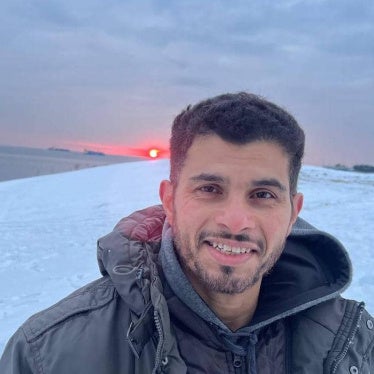(New York) – The apparent execution of the freelance journalist James Foley on August 19, 2014 in Syria by the Islamic State would be a war crime if confirmed. Groups detaining journalists should immediately and unconditionally release them.
The Islamic State, formerly known as the Islamic State in Iraq and Sham (ISIS), released a video of Foley’s purported execution. The group announced that it also is holding the US citizen journalist Steven Sotloff and that his fate depends on future US policy measures against the extremist group. Deliberate murder of civilians and hostage taking during an armed conflict are war crimes.
“James went to Syria because of his commitment to exposing the horrors civilians faced since the uprising against the government there,” said Peter Bouckaert, emergencies director at Human Rights Watch. “He, like the other journalists who are now held prisoner in Syria, courageously risked his life so that the world might know the truth and act to ease the suffering of the Syrian people.”
Foley, a US citizen, had been missing in Syria since November 22, 2012. Despite his family’s persistent efforts, including a global campaign to free their son, very little was known about his situation and whereabouts throughout the period of his abduction, including which group was holding him. In its publicized execution of the journalist, the Islamic State claimed that his killing was in retaliation for US military intervention against the group in Iraq.
Prior to his abduction, Foley worked as an independent journalist in the Middle East for five years. He covered the conflicts in Afghanistan, Libya, and Syria for the GlobalPost, Agence France-Presse, and other international news agencies. In addition to his journalistic work, Foley had assisted Human Rights Watch with the video documentation of human rights violations. He was also one of the filmmakers who filmed the work of the Human Rights Watch emergency team for the independent documentary “E-Team”.
The Committee to Protect Journalists has identified Syria as the most dangerous country in the world for journalists, finding that at least 69 other journalists have died covering the conflict there and more than 80 have been kidnapped, including approximately 20 who are still missing. Some of them are feared to be in the custody of the Islamic State. Human Rights Watch and other organizations have also documented dozens of instances in which government forces have detained journalists.
Both government authorities and non-government armed groups should immediately release and stop arbitrarily arresting, abducting and detaining journalists as well as human rights activists, humanitarians, and medical professionals for their legitimate work, Human Rights Watch said. United Nations Security Council resolution 2139 demands the release of all arbitrarily detained people in Syria.
In addition to the Islamic State’s abductions of journalists, Human Rights Watch has documented its abduction of civilians in Syria, including Alawites and Kurds. The group is also responsible for executing Syrian civilians. On May 29, according to accounts from first responders and local Kurdish officials, Islamic State forces entered the village of al-Taliliya near Ras al-`Ayn in northern Syria without resistance and executed at least 15 civilians, including seven children. On August 17, media reports said, the group executed as many as 700 members of the al-Sheitaat tribe in Deir al-Zour governorate, many of them civilians.
“The Islamic State’s apparent killing of Foley to make political points is the height of cowardice, in stark contrast to Foley’s bravery and humanity,” Bouckaert said. “While Foley leaves behind a legacy that will inspire the world, his murderers will join the ranks of those who bring nothing but shame upon themselves.”
Human Rights Watch expressed its deep condolences to the Foley family for the tragic loss of their brother and son.








